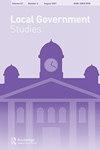选举弃权的财政影响:对巴西城市选民生物特征更新的研究
IF 1.9
4区 管理学
Q2 POLITICAL SCIENCE
引用次数: 1
摘要
本文章由计算机程序翻译,如有差异,请以英文原文为准。
Fiscal impacts of electoral abstention: a study on the electorate biometric update in Brazilian municipalities
ABSTRACT Because electoral abstention may generate a difference between the preferences of general voters, i.e., those who are eligible to vote, and the preferences of effective voters, i.e., those who do vote, policies adopted by incumbents may differ according to differences in turnout rates across the electorate. The Brazilian biometric electorate update offers an innovative opportunity to explore exogenous variations in abstention rates, allowing us to verify its impact on public policies, especially local public expenditures. By combining propensity score matching, differences-in-differences and instrumental variables models, we find that the electorate biometric update decreased abstention rates in local elections in Brazil, which, in turn, changed local public spending composition towards expenditures on education. The remaining categories of public expenditures explored in this study, however, seem not to be affected by the change in the electorate composition.
求助全文
通过发布文献求助,成功后即可免费获取论文全文。
去求助
来源期刊

Local Government Studies
Multiple-
CiteScore
4.80
自引率
15.80%
发文量
43
期刊介绍:
Local Government Studies is the leading journal for the study of local politics, policy, public administration and management and governance. First established in 1975, it is an influential forum for critical dialogue and exchange on local government and a vital resource for academics, politicians, policy makers and practitioners internationally. The editors welcome submissions in this field, particularly work of a comparative, methodologically innovative and theoretically challenging nature.
 求助内容:
求助内容: 应助结果提醒方式:
应助结果提醒方式:


